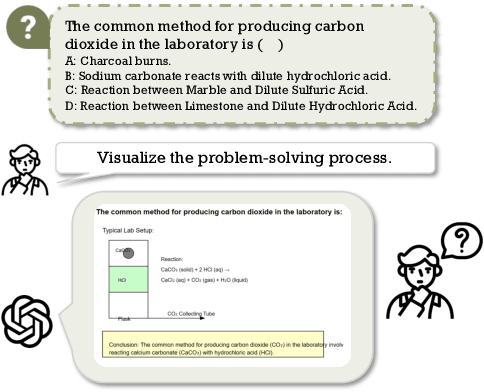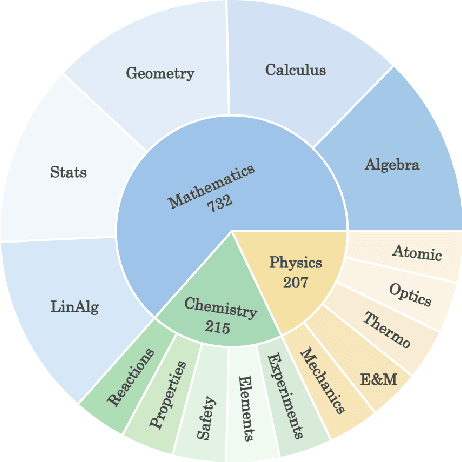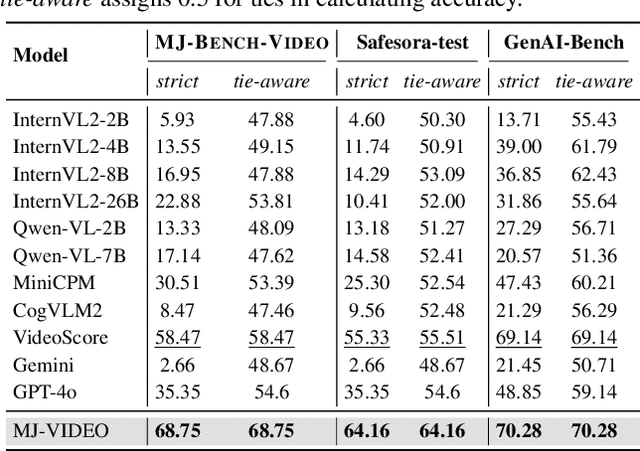Siwei Han
SimpleMem: Efficient Lifelong Memory for LLM Agents
Jan 05, 2026Abstract:To support reliable long-term interaction in complex environments, LLM agents require memory systems that efficiently manage historical experiences. Existing approaches either retain full interaction histories via passive context extension, leading to substantial redundancy, or rely on iterative reasoning to filter noise, incurring high token costs. To address this challenge, we introduce SimpleMem, an efficient memory framework based on semantic lossless compression. We propose a three-stage pipeline designed to maximize information density and token utilization: (1) \textit{Semantic Structured Compression}, which applies entropy-aware filtering to distill unstructured interactions into compact, multi-view indexed memory units; (2) \textit{Recursive Memory Consolidation}, an asynchronous process that integrates related units into higher-level abstract representations to reduce redundancy; and (3) \textit{Adaptive Query-Aware Retrieval}, which dynamically adjusts retrieval scope based on query complexity to construct precise context efficiently. Experiments on benchmark datasets show that our method consistently outperforms baseline approaches in accuracy, retrieval efficiency, and inference cost, achieving an average F1 improvement of 26.4% while reducing inference-time token consumption by up to 30-fold, demonstrating a superior balance between performance and efficiency. Code is available at https://github.com/aiming-lab/SimpleMem.
Adapting Web Agents with Synthetic Supervision
Nov 08, 2025Abstract:Web agents struggle to adapt to new websites due to the scarcity of environment specific tasks and demonstrations. Recent works have explored synthetic data generation to address this challenge, however, they suffer from data quality issues where synthesized tasks contain hallucinations that cannot be executed, and collected trajectories are noisy with redundant or misaligned actions. In this paper, we propose SynthAgent, a fully synthetic supervision framework that aims at improving synthetic data quality via dual refinement of both tasks and trajectories. Our approach begins by synthesizing diverse tasks through categorized exploration of web elements, ensuring efficient coverage of the target environment. During trajectory collection, we refine tasks when conflicts with actual observations are detected, mitigating hallucinations while maintaining task consistency. After collection, we conduct trajectory refinement with a global context to mitigate potential noise or misalignments. Finally, we fine-tune open-source web agents on the refined synthetic data to adapt them to the target environment. Experimental results demonstrate that SynthAgent outperforms existing synthetic data methods, validating the importance of high-quality synthetic supervision. The code will be publicly available at https://github.com/aiming-lab/SynthAgent.
Alignment Tipping Process: How Self-Evolution Pushes LLM Agents Off the Rails
Oct 06, 2025



Abstract:As Large Language Model (LLM) agents increasingly gain self-evolutionary capabilities to adapt and refine their strategies through real-world interaction, their long-term reliability becomes a critical concern. We identify the Alignment Tipping Process (ATP), a critical post-deployment risk unique to self-evolving LLM agents. Unlike training-time failures, ATP arises when continual interaction drives agents to abandon alignment constraints established during training in favor of reinforced, self-interested strategies. We formalize and analyze ATP through two complementary paradigms: Self-Interested Exploration, where repeated high-reward deviations induce individual behavioral drift, and Imitative Strategy Diffusion, where deviant behaviors spread across multi-agent systems. Building on these paradigms, we construct controllable testbeds and benchmark Qwen3-8B and Llama-3.1-8B-Instruct. Our experiments show that alignment benefits erode rapidly under self-evolution, with initially aligned models converging toward unaligned states. In multi-agent settings, successful violations diffuse quickly, leading to collective misalignment. Moreover, current reinforcement learning-based alignment methods provide only fragile defenses against alignment tipping. Together, these findings demonstrate that alignment of LLM agents is not a static property but a fragile and dynamic one, vulnerable to feedback-driven decay during deployment. Our data and code are available at https://github.com/aiming-lab/ATP.
From EduVisBench to EduVisAgent: A Benchmark and Multi-Agent Framework for Pedagogical Visualization
May 22, 2025



Abstract:While foundation models (FMs), such as diffusion models and large vision-language models (LVLMs), have been widely applied in educational contexts, their ability to generate pedagogically effective visual explanations remains limited. Most existing approaches focus primarily on textual reasoning, overlooking the critical role of structured and interpretable visualizations in supporting conceptual understanding. To better assess the visual reasoning capabilities of FMs in educational settings, we introduce EduVisBench, a multi-domain, multi-level benchmark. EduVisBench features diverse STEM problem sets requiring visually grounded solutions, along with a fine-grained evaluation rubric informed by pedagogical theory. Our empirical analysis reveals that existing models frequently struggle with the inherent challenge of decomposing complex reasoning and translating it into visual representations aligned with human cognitive processes. To address these limitations, we propose EduVisAgent, a multi-agent collaborative framework that coordinates specialized agents for instructional planning, reasoning decomposition, metacognitive prompting, and visualization design. Experimental results show that EduVisAgent substantially outperforms all baselines, achieving a 40.2% improvement and delivering more educationally aligned visualizations. EduVisBench and EduVisAgent are available at https://github.com/aiming-lab/EduVisBench and https://github.com/aiming-lab/EduVisAgent.
MDocAgent: A Multi-Modal Multi-Agent Framework for Document Understanding
Mar 18, 2025Abstract:Document Question Answering (DocQA) is a very common task. Existing methods using Large Language Models (LLMs) or Large Vision Language Models (LVLMs) and Retrieval Augmented Generation (RAG) often prioritize information from a single modal, failing to effectively integrate textual and visual cues. These approaches struggle with complex multi-modal reasoning, limiting their performance on real-world documents. We present MDocAgent (A Multi-Modal Multi-Agent Framework for Document Understanding), a novel RAG and multi-agent framework that leverages both text and image. Our system employs five specialized agents: a general agent, a critical agent, a text agent, an image agent and a summarizing agent. These agents engage in multi-modal context retrieval, combining their individual insights to achieve a more comprehensive understanding of the document's content. This collaborative approach enables the system to synthesize information from both textual and visual components, leading to improved accuracy in question answering. Preliminary experiments on five benchmarks like MMLongBench, LongDocURL demonstrate the effectiveness of our MDocAgent, achieve an average improvement of 12.1% compared to current state-of-the-art method. This work contributes to the development of more robust and comprehensive DocQA systems capable of handling the complexities of real-world documents containing rich textual and visual information. Our data and code are available at https://github.com/aiming-lab/MDocAgent.
MJ-VIDEO: Fine-Grained Benchmarking and Rewarding Video Preferences in Video Generation
Feb 03, 2025



Abstract:Recent advancements in video generation have significantly improved the ability to synthesize videos from text instructions. However, existing models still struggle with key challenges such as instruction misalignment, content hallucination, safety concerns, and bias. Addressing these limitations, we introduce MJ-BENCH-VIDEO, a large-scale video preference benchmark designed to evaluate video generation across five critical aspects: Alignment, Safety, Fineness, Coherence & Consistency, and Bias & Fairness. This benchmark incorporates 28 fine-grained criteria to provide a comprehensive evaluation of video preference. Building upon this dataset, we propose MJ-VIDEO, a Mixture-of-Experts (MoE)-based video reward model designed to deliver fine-grained reward. MJ-VIDEO can dynamically select relevant experts to accurately judge the preference based on the input text-video pair. This architecture enables more precise and adaptable preference judgments. Through extensive benchmarking on MJ-BENCH-VIDEO, we analyze the limitations of existing video reward models and demonstrate the superior performance of MJ-VIDEO in video preference assessment, achieving 17.58% and 15.87% improvements in overall and fine-grained preference judgments, respectively. Additionally, introducing MJ-VIDEO for preference tuning in video generation enhances the alignment performance.
MMIE: Massive Multimodal Interleaved Comprehension Benchmark for Large Vision-Language Models
Oct 14, 2024



Abstract:Interleaved multimodal comprehension and generation, enabling models to produce and interpret both images and text in arbitrary sequences, have become a pivotal area in multimodal learning. Despite significant advancements, the evaluation of this capability remains insufficient. Existing benchmarks suffer from limitations in data scale, scope, and evaluation depth, while current evaluation metrics are often costly or biased, lacking in reliability for practical applications. To address these challenges, we introduce MMIE, a large-scale knowledge-intensive benchmark for evaluating interleaved multimodal comprehension and generation in Large Vision-Language Models (LVLMs). MMIE comprises 20K meticulously curated multimodal queries, spanning 3 categories, 12 fields, and 102 subfields, including mathematics, coding, physics, literature, health, and arts. It supports both interleaved inputs and outputs, offering a mix of multiple-choice and open-ended question formats to evaluate diverse competencies. Moreover, we propose a reliable automated evaluation metric, leveraging a scoring model fine-tuned with human-annotated data and systematic evaluation criteria, aimed at reducing bias and improving evaluation accuracy. Extensive experiments demonstrate the effectiveness of our benchmark and metrics in providing a comprehensive evaluation of interleaved LVLMs. Specifically, we evaluate eight LVLMs, revealing that even the best models show significant room for improvement, with most achieving only moderate results. We believe MMIE will drive further advancements in the development of interleaved LVLMs. We publicly release our benchmark and code in https://mmie-bench.github.io/.
Generating Chain-of-Thoughts with a Direct Pairwise-Comparison Approach to Searching for the Most Promising Intermediate Thought
Feb 10, 2024Abstract:To improve the ability of the large language model (LLMs) to handle complex reasoning problems, chain-of-thoughts (CoT) methods were proposed to guide LLMs to reason step-by-step, facilitating problem solving from simple to complex tasks. State-of-the-art approaches for generating such a chain involve interactive collaboration, where the learner generates candidate intermediate thoughts, evaluated by the LLM, guiding the generation of subsequent thoughts. However, a widespread yet understudied problem is that the evaluation from the LLM is typically noisy and unreliable, potentially misleading the generation process in selecting promising intermediate thoughts. In this paper, motivated by Vapnik's principle, we propose a novel comparison-based CoT generation algorithm that directly identifies the most promising thoughts with the noisy feedback from the LLM. In each round, we randomly pair intermediate thoughts and directly prompt the LLM to select the more promising one from each pair, allowing us to identify the most promising thoughts through an iterative process. To further model the noise in the comparison, we resort to the techniques of ensemble and dueling bandits and propose two variants of the proposed algorithm. Experiments on three real-world mathematical and reasoning tasks demonstrate the effectiveness of our proposed algorithm and verify the rationale of the direct pairwise comparison.
 Add to Chrome
Add to Chrome Add to Firefox
Add to Firefox Add to Edge
Add to Edge